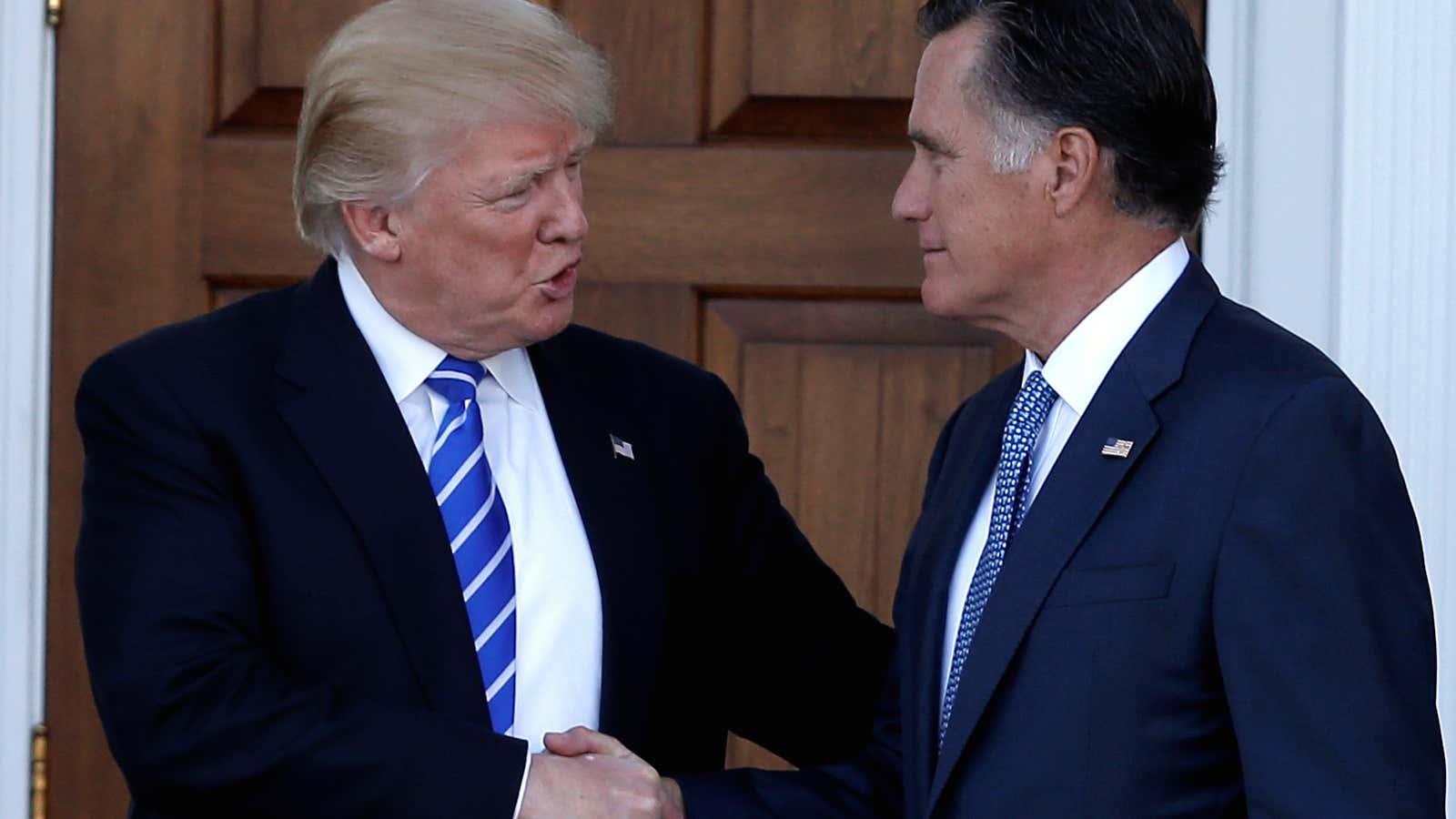Donald Trump was a good choice for TIME Magazine’s “Person of the Year.” He’s certainly done enough in 2016, and probably too much.
But Mitt Romney would’ve also been a great choice.
Sure, some American presidents have been belligerent, racist, or sexually predatory. But has there ever been a US president so uninterested in democracy? Who’s threatened to jail his opponent, or invited his family members into confidential meetings with him? Who treats the office he was elected to with such disdain?
Individually, many of Trump’s characteristics and views are not unique, though are disturbing. Not to mention that we’ve known about them—just as we’ve known about allegations of Russian interference in our election—for some time now. But for Republicans, nothing was enough. The real story here isn’t Donald Trump’s victory, it’s the American establishment that allowed the victory to happen, and then eagerly boarded the White House bandwagon.
Which brings us back to Romney.
The selection of Rex Tillerson, CEO of ExxonMobil, for secretary of state suggests Trump was toying with Romney over the past few weeks. Perhaps all the dinner photo ops and rumors about a potential cabinet position were really just some kind of sick revenge exacted for the former Massachusetts governor’s harsh critiques of the president-elect. Back in March, Romney called Trump a “fake,” “fraud,” “phony,”and “a con man.”
But the fact that Romney would even consider a potential position in the president-elect’s cabinet is the more important issue here. Did he think he could moderate Trump or, worse, was he warming up to the president-elect?
Romney isn’t the only Republican who has eagerly turned the other cheek, however. Trump mocked Texas senator Ted Cruz’s father and viciously attacked his wife during the GOP primary—and yet, there was Cruz, calling voters on Trump’s behalf in October. New Jersey governor Chris Christie was repeatedly and roundly belittled by Trump and reduced to a kind of manservant. Yet Christie put up with this treatment for months on end, only to be unceremoniously sidelined after the results were tallied.
Indeed, no matter what Trump said or did, much of the Republican Party could not or would not break with him. This despite a long and exhaustively catalogued list of lies, insults and threats. Even president Barack Obama wished the president-elect success. But success in what, exactly: Accelerating climate change? Amplifying Putin’s efforts to hack American democracy? Deporting millions of people? Breaking apart NATO, and end Pax Americana? Installing neo-Nazis into the national corridors of power?
Democrats won the popular vote, of course. I believe they fielded the wrong candidate, and have reason to question that decision. But at least they stood up to Trump. The GOP, on the other hand, went along with Trump, even as every week seemed to produce a new revelation of his unfitness for office.
Romney in particular could have and should have worked harder to resist Trump’s pull by holding fast to his criticisms and rallying reasonable Republicans. Respected, well-funded, and high-profile, Romney could have used his status to rally millions of Americans who were clearly desperate for a leader.
Though Romney turned on Trump—however briefly—this year, he did so in a curiously amnesiac fashion, conveniently overlooking his own complicity in Trump’s political rise. In 2012, then-presidential candidate Mitt Romney sought (successfully) the billionaire’s endorsement, even as that billionaire was spreading birther racism.
Romney is perhaps not the steadfast man of principle we might have been led to believe. He had an opportunity to admit his mistakes and use them to explain why cultivating the support of an extremist to pursue one’s agenda never ends well; he could have apologized for seeking Trump’s endorsement, which would have made his condemnation of Trump’s misogyny, racism, and xenophobia even more meaningful.
But ultimately, it seems Romney didn’t have the guts to see his criticisms through. The political risks were just too great—and perhaps the potential rewards seemed too high. Not that his spinelessness was unique. The same could be said of other Republican leaders and elder statesmen, as well. Former presidents George Bush I and II both claimed to be abstaining from the political race. Meanwhile, despite a handful of Republican representatives who claimed they would break party ranks on election day, most high-profile senators ultimately sided with the nominee. Even John McCain, who had criticized Trump throughout the campaign, declined to publicly withdraw his support.
As a result, what could have been a united wall of opposition became instead a soft patchwork of excuses and double-speak and handwringing. Senate majority leader Mitch McConnell, who did vote for Trump, spent the weeks leading up the election stubbornly refusing to discuss his candidate.
These and many other well-to-do, talented, white politicians knew they would not suffer in any conceivable way should Trump be elected, who had no reason to fear for their security or dignity, souled their souls for White House access and the chance to see their political agendas realized.
And at what cost? We can look to once-vocal Trump supporter Joe Walsh for an instructive lesson. The former Illinois Congressman now says he’s appalled by Trump’s recent feuding with the CIA, horrified by allegations of Russian interference in our national election, and demands a full and thorough investigation. Yet Trump’s behavior has not changed in the last year and a half. Among the indicators Republicans who supported Trump ignored were early indications that a foreign government was undermining our sovereignty.
Ultimately, perhaps we shouldn’t be surprised.
It was the radical right who spent years demonizing Democrats, vastly inflating the threat of terrorism, downplaying not just climate change but facts, science, the very concept of truth itself.
They encouraged ever more radical voices, gerrymandered political districts, and promoted ever more ludicrous conspiracy theories, leaving America vulnerable to a populist demagogue—or, worse, interference by an authoritarian nemesis. The Person of the Year isn’t Donald Trump. It’s all the men (and they are mostly men) who spent years making Donald Trump possible.
